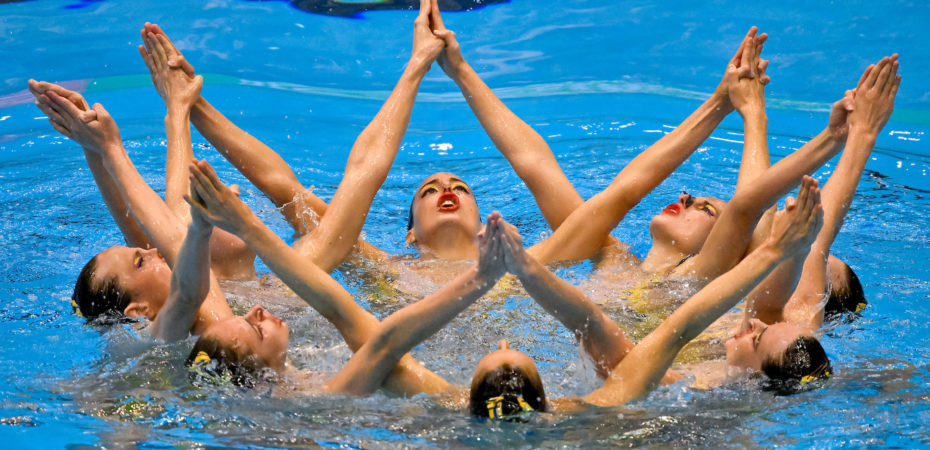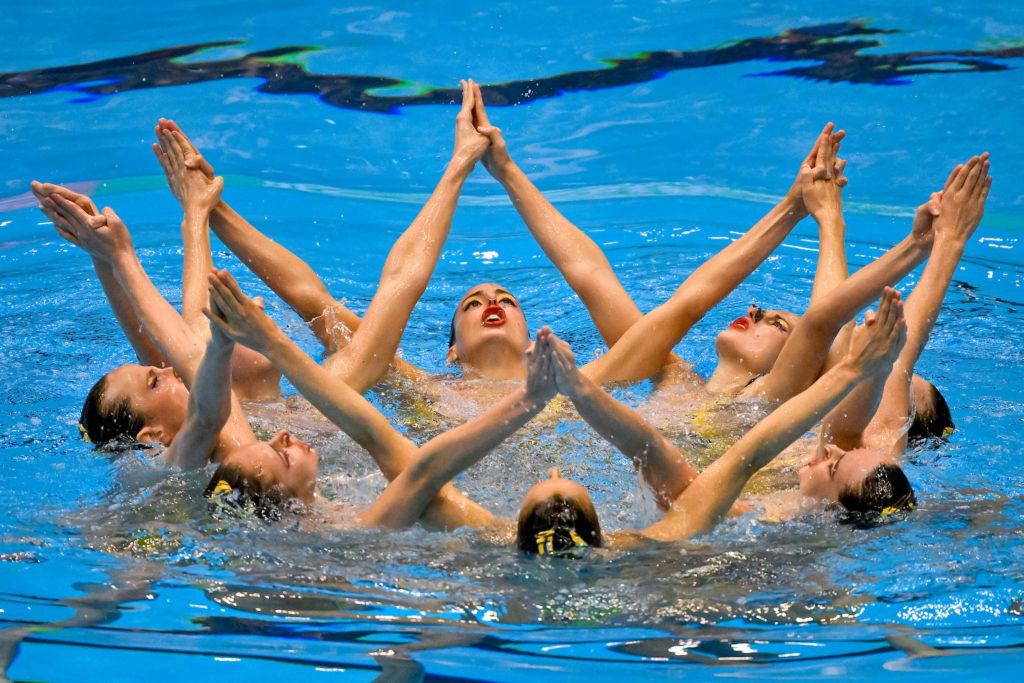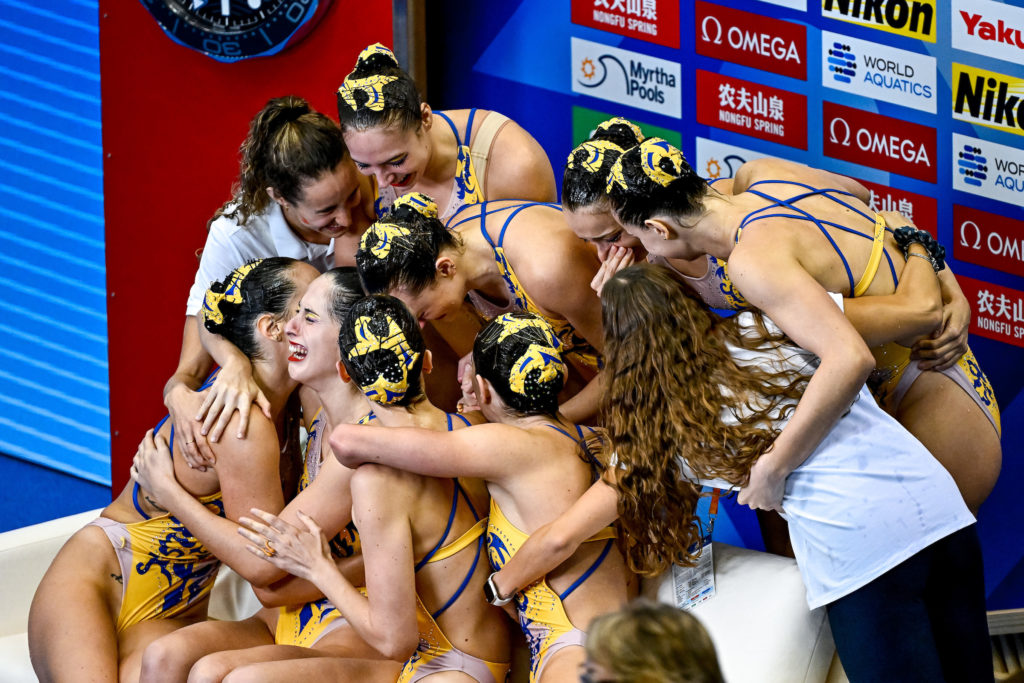The only artistic swimming final of the fifth day of competition at the 2023 World Championships was the technical team final. Spain, the reigning European Champion, won its first World team gold since 2009, and first-ever gold medal in an Olympic team event.
In the morning, Anna-Maria and Eirini Alexandri of Austria placed first in the free duet preliminary with a score of 251.4313. Shortly after, the men’s free solo preliminary took place, and Kenneth Gaudet of the USA qualified to the final in first with a score of 179.7834.
TECHNICAL TEAM FINAL
Spain became World Champion in the technical team with a score of 281.6893 for its Flamenco choreography set to a fusion of Spanish and Japanese music. The nation had not competed in this event at the World Championships since 2019.
“We are super excited and proud,” Paula Ramirez said. “And exhausted! We left everything we had over there. This year was amazing. We worked really hard so we are really proud.”
The Spaniards, who are also the 2023 European Champions in this event, had originally qualified in sixth, but had received two base marks in the preliminary round.
“I think it was good for us,” she continued. “Obviously, no one wants to have base marks, but it was good to go to the final knowing which of our elements we had to work on really hard until we had them perfectly. That’s what we did. We were excited to demonstrate in the final that we could do it perfectly. And no base mark, that’s the new synchro, no base mark!”
Italy, European silver medalist and defending World bronze medalist, had qualified to the final in third, albeit with a base mark, and managed to move up one spot in the ranking. The Italians won silver with a score of 274.5155, and received their full Degree of Difficulty this time for their “Fire” routine.
The USA won bronze with its Michael Jackson routine and a score of 273.7396. Like the Italians, the Americans had one base mark in the preliminary, but were credited their full DD of 39.15 in the final.
China, defending World Champion, had qualified to the final in first place and with the highest declared DD of 39.90. Despite undeniably performing the most well-executed, strong, technically sound, precise, dynamic and engaging routine of the final, the Chinese had two base marks which dropped them to seventh place.
While every team either stuck with its DD or slightly decreased by a few tenths for the final, Japan increased its DD by 2.1 even though it had two base marks in the preliminary round. The Japanese still received one in the final and ultimately ranked fourth with a score of 260.1055.
This was Egypt’s second team final here in Fukuoka, and first World team final since 2009. The Egyptians placed 10th in the technical team tonight with their “Dancing Violin” routine, and were particularly thrilled at receiving no base marks.
“Being in two World finals is a big first for the whole team, it’s so overwhelming but it’s amazing,” Nihal Saafan said. “In the prelims, we got two base marks, so to have no base marks now is an amazing feeling. After what we did in Soma Bay [World Cup], it gave us a huge push to strive for more.”
Similarly, Australia made its first appearance in a World team final since 2007. The Australians placed 12th with a score of 196.4087 for their “Madagascar” routine.
“We were all really excited going into it,” Georgia Courage-Gardiner said. “We just wanted to do our best and to show that Australia is improving. It’s really motivating to see that our work is paying off and that we are bringing Australia up in the World again.”
The athletes all moved to Perth in January to be part of a new centralized training program and started working with new coaches Paula Klamburg and Nawal Leon Kurson. They went from training a couple hours a day in their respective clubs and only gathering for national team training camps a few times a year, to living and training together for eight hours a day.
“It’s been a really long road here,” Hannah Burkhill said. “It’s been a massive change. We all moved together and it’s been endless training, as all teams do, so we are so happy about our results so far. We took a really big step in this competition by making the final, it’s really exciting and we are really proud.”
FREE DUET PRELIMINARY
The day started with the women’s free duet preliminary, where 36 pairs vied for a spot to the final. The race to the highest DD continued, with three duets declaring over 40 in difficulty: Japan (41.05), Italy (40.30) and Ukraine (40.25).
The reigning European Champions and 2022 World bronze medalists Anna-Maria Alexandri and Eirini Alexandri of Austria ultimately qualified in first with a score of 251.4313 for their “Condor” routine. The triplet sisters actually decreased their DD since the European Championships, going from 40.40 to 39.85 in Fukuoka.
After receiving a base mark in the technical duet final on Sunday, which cost them a medal, they made the decision to modify their hybrids in this free duet. The strategy paid off as they were credited for their full difficulty this morning.
“We are very disappointed about Sunday,” Anna-Maria said. “Of course, we look forward and not behind, but it’s still there. They told us the base mark was because of our unbalanced rotations. We only had three unbalanced in our free hybrids, so we removed all of them. That’s why our difficulty is lower, but it worked well today.”
Maryna and Vladyslava Aleksiiva of Ukraine, silver medalists at last year’s World Championships, qualified in second place with a score of 251.0981, only 0.3332 points behind the Austrians. Megumi Field and Ruby Remati of the USA swam in first to “Dark Necessities” by Red Hot Chilli Peppers and ultimately placed third with 225.9459.
The other qualified duets are from Israel, Spain, the Netherlands, Italy, France, China, Great Britain, Japan and Greece.
Anastasia Bayandina and Eve Planeix of France competed in the free duet for the first time this year, unveiling a new choreography to the theme of “Alter Ego.” The routine was actually originally created over a year and a half ago by Gana Maksimova, but of course with the old system in mind.
The French tried as best as possible to keep the essence of the choreography intact while adapting the free hybrids to the difficulty system.
“We really wanted to keep as much of this beautiful choreography as possible within the new rules,” coach Julie Fabre said. “If we raise the difficulty like our main competitors are doing, then it becomes impossible. We are already qualified for the Games so we don’t have this added pressure; that’s why we wanted to see what we could do at this competition. It’s important to also be realistic about the technical abilities of the athletes, so if we push to the maximum while maintaining the artistry of the routine, then that’s where we are at right now, 33.25, knowing that the original choreography had us at 15 or so. Most importantly, the idea was to also make a point, enough with neglecting artistry and choreography. And to affirm our belief that if artistry disappears, then we’re going to kill the sport. So we seized this opportunity here to try to do just that.”
Although the French had two base marks, they scored 193.7375 and qualified to the final in eighth place.
Wang Liuyi and Qianyi of China, reigning World Champions, had three base marks in their routine, but thankfully made it to the final in ninth place. Higa Moe and Yasunaga Mashiro of Japan, who won the technical duet event on Sunday, had gone for the highest difficulty (41.05) but received four base marks. They still made it to the final in 11th place with a score of 178.1583, and will thus get a chance to improve on this swim.
The women’s free duet final will take place on Thursday, July 20 at 7:30 pm local.
MEN FREE SOLO PRELIMINARY
Just like in the technical event, 10 men competed in the men’s free solo preliminary this afternoon. It wasn’t however quite the same athletes, as Mexico didn’t enter this free event but Japan did, and Spain was represented by Dennis Gonzalez Boneu. All 10 athletes will move on to tomorrow’s final.
Kenneth Gaudet of the USA qualified to the final in first with a score of 179.7834. He had declared the highest DD of the field with a 31.85, which helped him stay in the lead despite a base mark. Eduard Kim of Kazakhstan finished second with a score of 173.0499, while Great Britain’s Ranjuo Tomblin qualified in third with 172.5166. Neither received base marks.
The reigning World Junior Champion in this event Dennis Gonzalez Boneu of Spain earned the highest artistic impression score of the day with 87.2000. Unfortunately, he had a base mark on his fifth hybrid. As he was already only starting with a 23.30 DD, that dropped him to fourth place.
Gonzalez Boneu swam a different routine from what we had seen of him in the World Cup Super Final in Oviedo a few weeks ago. In Fukuoka, he used the song “Golden Hour” by JVKE and displayed great emotion and artistry throughout the routine. Don’t miss his captivating and energetic performance in the final.
Another absorbing performance came from Gustavo Sanchez of Colombia with his “Passion of Christ” routine. Unfortunately, he received two base marks today, which dropped him to sixth place with a score of 166.3022. Sanchez had come into this event with the third-highest DD (26.35), and will certainly aim for a clean performance in the final.
Sato Yotaro of Japan, silver medalist at the 2022 World Junior Championships, swam solo for the first time this season. He scored 167.7478 with one base mark for his “Alien” routine and finished fifth. France’s Quentin Rakotomalala, 2022 European bronze medalist, finished seventh with one base mark and a score of 145.3501 for his “Black Panther” routine.
Javier Ruisanchez of Puerto Rico swam to “Writing’s On The Wall” by Sam Smith, and was visibly emotional after his performance. He landed in ninth place with 104.5375 and two base marks after this preliminary round, but the results didn’t matter as much to him as the deeper meaning behind the choreography.
“It was a very emotional swim for me,” he said. “Originally, this was not my free solo music at all. But I recently went through a pretty big change in my life, I got divorced, so I decided to rewrite my solo and use Sam Smith because he’s an artist that’s always helped me through my challenges in life. This was my way of letting go from the past, and regardless of the results and all the base marks, my way of closing a chapter in my life and starting a new one.”
Besides Kim and Tomblin, only Kantinan Adisaisiributr of Thailand managed a basemark-less performance.
The men’s free solo final will take place on Wednesday, July 19 at 4:30 pm local.
ARTICLE BY CHRISTINA MARMET
All photos: Andrea Masini, Federica Muccichini / Deepbluemedia
Purchase photos of the competition on Deepbluemedia with the code “INSIDESYNCHRO” for 15% off!




In my opinion, World Aquatics should optimise their new scoring system especially when it comes to the final DD. I think the swimmers are now focusing more on how to avoid base marks. Many routines are just so painful to watch.
I’m so frustrated that performances with more synchronisation errors and poor-executed movements throughout the routine get more points just because the judges acknowledge their DD. And your hybrid would lose a huge amount of points just because a single basic movement that doesn’t meet the requirements and the rest, no matter how good your execution is, are meaningless.
I think it would be better to just deduct the DD or downgrade the levels of the problematic moves in a hybrid than just give it a base mark right away.
So painful to watch.
In other sports is like that, you declare a triple twist but only do 2.5, you’re credited for the 2.5 and also lose points in execution. What is happening now is horrible, too brutal. You can have 9.0/9.5s on all your elements, 9.5 in AI, and it’s meaningless as you say. A regulation that does not reward the best is not a good regulation.